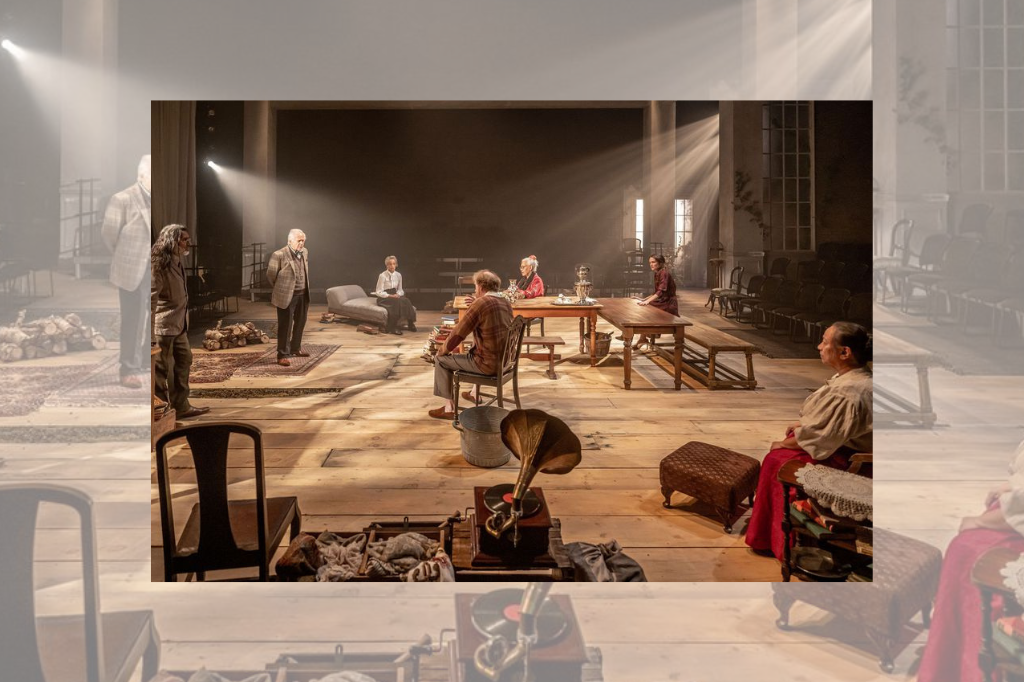REVIEW: Uncle Vanya at Crow’s Theatre
Nothing happens, everything happens — it’s the old adage when describing the work of Anton Chekhov. Russia’s most famous playwright (and a medical doctor by profession) was known for his wit; his gnawing portrayal of existential nothingness; his devilish good looks. Chekhov’s writing in Russian is sexy and funny, poignant and surprising — and that’s often lost in translation, due in no small part to fundamental differences in English and Russian syntax. In Russian, you can tack a joke onto the end of a sentence and completely change the meaning of everything that came before — that’s really, really hard to replicate in English.
Some context here: I’ve spent the past three years learning Russian almost exclusively to better understand Chekhov’s work. I’m intensely interested in what happens to words on the journey from one language to another — what’s lost, what’s gained, what’s complicated — and Chekhov’s plays in particular are a fascinating case study in translated drama. The angst often gets preserved but the humour doesn’t, leading many to conceive Chekhov’s plays as dusty and perilously boring. (They aren’t.)
Uncle Vanya at Crow’s Theatre avoids those pitfalls of Chekhov in translation — dryness, aloofness, stasis. Liisa Repo-Martell’s adaptation is alluring and right at home in the mouths of director Chris Abraham’s actors; this Vanya, though set firmly in Czarist Russia, feels relatable and even startlingly contemporary, affirming the timelessness of the themes Chekhov explored in his writing. Complemented by Abraham’s inspired, dynamic blocking (the play’s staged in the round, and as such the Streetcar Crowsnest Guloien Theatre feels completely transformed), and glorious set by Julie Fox and Josh Quinlan, it’s a triumphant Uncle Vanya, and it’s not to be missed.
Uncle Vanya is the story of a family in crisis, set on the grounds of a failing estate. The titular uncle (Tom Rooney) is depressed beyond reprieve; his niece Sonya (Bahia Watson), meanwhile, is driven and compassionate, sunny in comparison to her immediate family but suppressing a bitterness that eventually bubbles through the cracks. Sonya’s grandfather, the persnickety Alexandre (Eric Peterson), has a litany of health conditions, attended to by the attractive doctor Astrov (Ali Kazmi), who Sonya deeply, terribly, and unrequitedly loves. Alexandre has a much younger and beautiful wife, Yelena (Shannon Taylor), who seems so bored by her life she might die at any moment — or at least, that’s how it looks through the filters of the men constantly fawning over her. Completing this tangle of family and misfits are Marina and Maria (Carolyn Fe and dtaborah johnson), the wise old women of the group, and Telegin, also known as Waffles, Astrov’s trusty companion (Anand Rajaram).
Of course, things happen in the play — people fight, take risks, make consequential choices — but the magic of Uncle Vanya unfurls in how relationships blossom and atrophy, seemingly in real time. We fall in love with these characters in quiet moments alone, particularly Vanya and Sonya. Rooney is a master, a legend of Canadian theatre for good reason, balancing immaculately the humour and despair Vanya invites. Rooney embodies Vanya’s depression, sagged shoulders and all, but never does it feel like a caricature. Watson too is luminous in her role, playing up the youth and naivety of the character; when her heart breaks, so too do ours. Rooney and Watson are ideal scene partners, perfectly balanced as opposite poles on the emotional scale. Kazmi too plays Astrov with verve and precision, deftly handling the character’s moments of cluelessness and simultaneous brilliance, especially when volleying with the similarly agile Taylor. (It’s worth pointing out Kazmi also bears striking resemblance to Chekhov himself — a lovely and amusing detail.) Peterson shines in moments of monologue — quieter, subtler moments, when the layers of the sad old man that is Alexandre can peer through to the outside world.
Abraham’s direction perfectly matches the tone of Chekhov’s story. Having the audience on four sides magnifies the feeling of voyeurism — that there is nowhere in this vast estate that can ever truly be quiet or peaceful. Stacks of books and trinkets make the space feel lived-in and authentic, and Thomas Ryder Payne’s music and ambient sound design further heighten the play’s realism — rainstorms abound, and at believable, varied volumes. A very small gripe: sometimes actors’ words become just a touch garbled, reverberating against the exposed hard walls of Crow’s. But those moments of muddiness are quick and fast forgiven — in real life, don’t we all sometimes lose a few words?
Repo-Martell’s treatment of Vanya is delicate and wholly faithful to Chekhov’s story. Humour abounds, stakes fluctuate. In 2022 — at the precipice of recession, in the midst of a war, the dénouement of a pandemic (though Chekhov’s was cholera, not COVID) — this glance into failed family seems prescient, a wise programming choice; while Chekhov’s grasps at manic-depressive existentialism have never been beyond societal comprehension, they feel all the more urgent at this particular moment in time. Repo-Martell and Abraham are a winning creative team, and this Uncle Vanya is wonderful. Поздравления (or, congrats, team).
Uncle Vanya ran at Crow’s Theatre September 6 through October 2, 2022.















Comments